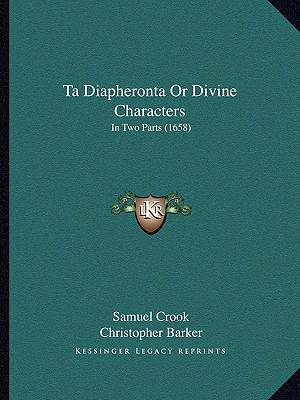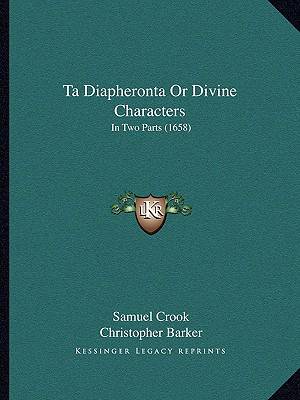
- Afhalen na 1 uur in een winkel met voorraad
- Gratis thuislevering in België vanaf € 30
- Ruim aanbod met 7 miljoen producten
- Afhalen na 1 uur in een winkel met voorraad
- Gratis thuislevering in België vanaf € 30
- Ruim aanbod met 7 miljoen producten
Zoeken
Ta Diapheronta Or Divine Characters
In Two Parts (1658)
Samuel Crook, Christopher Barker, William Garrett
Paperback | Engels
€ 66,45
+ 132 punten
Uitvoering
Omschrijving
Ta Diapheronta Or Divine Characters: In Two Parts (1658) is a book written by Samuel Crook. The book is divided into two parts and is a collection of essays on various religious topics. The first part of the book focuses on the nature of God, the Trinity, and the attributes of God. The second part of the book delves into the nature of man, sin, and salvation. Crook's writing is influenced by his Puritan beliefs and he uses biblical references to support his arguments. The book is a reflection of the religious debates of the time and provides insight into the theological beliefs of the Puritans. Overall, Ta Diapheronta Or Divine Characters: In Two Parts is a valuable resource for anyone interested in the history of religious thought in the 17th century.This scarce antiquarian book is a facsimile reprint of the old original and may contain some imperfections such as library marks and notations. Because we believe this work is culturally important, we have made it available as part of our commitment for protecting, preserving, and promoting the world's literature in affordable, high quality, modern editions, that are true to their original work.
Specificaties
Betrokkenen
- Auteur(s):
- Uitgeverij:
Inhoud
- Aantal bladzijden:
- 642
- Taal:
- Engels
Eigenschappen
- Productcode (EAN):
- 9781167243691
- Verschijningsdatum:
- 10/09/2010
- Uitvoering:
- Paperback
- Formaat:
- Trade paperback (VS)
- Afmetingen:
- 210 mm x 279 mm
- Gewicht:
- 1419 g

Alleen bij Standaard Boekhandel
+ 132 punten op je klantenkaart van Standaard Boekhandel
Beoordelingen
We publiceren alleen reviews die voldoen aan de voorwaarden voor reviews. Bekijk onze voorwaarden voor reviews.











